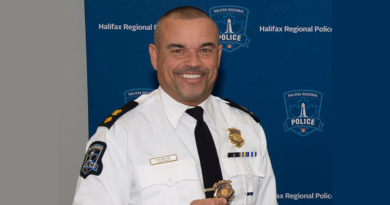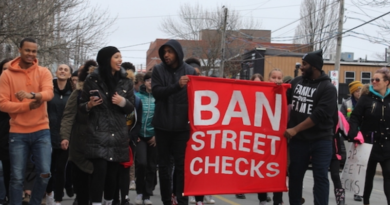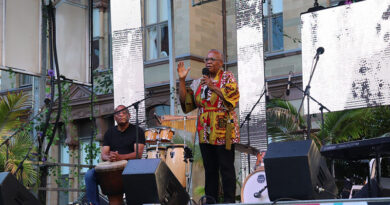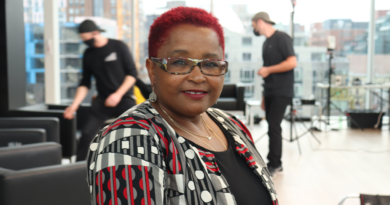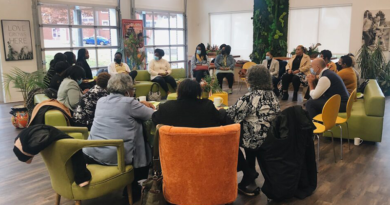On the set as filming of documentary Black Ice begins in Nova Scotia

Last week, Oscar-nominated director Hubert Davis and a film crew from Toronto flew to Nova Scotia to interview descendants and family of the former all-Black hockey league. The filming is for a new documentary based on the book Black Ice: The Lost History of the Colored Hockey League of the Maritimes, 1895-1925, which written by brothers George and Darril Fosty, and published in 2004 by Nimbus Publishing.
“Each of the interviews is enlightening to me because it gives a new insight into the personal stories,” Davis said. “Obviously coming out here and talking to people who were direct descendants of people who played in the Colored Hockey League was really important because it really helped to solidify [the question] what was the Black community like at that time?”
“And I think that part about it, I didn’t know going in. And so, it’s been a lot of learning for me. Even throughout, just learning more about these stories and trying to uncover it and get that out to a wider audience.”
Davis is faced with a tough task because all the former members of the league have since passed, but he said that’s not discouraging him.
“The further you get away from it, the harder it is,” he said. “And so that’s why I think it’s so important right now — like literally, today — to try and document as much as we can.”
On Saturday, Davis and his crew visited Zion Baptist Church in Truro where they interviewed Lynn Jones whose father and uncle played in the league. They also interviewed Stanley Carvery, who knew a number of players on the Africville Seasides.
“Obviously something like the direct descendants in the photographs are so important, because then people really understand the connection between being able to see something and then people to talk about their own experience,” Davis said. “Like they didn’t see it themselves, but their parents might have talked about it, or they got to hear those stories.”
Davis and his crew also visited the home of Paul Byard — my father — whose father, St. Clair Byard, played for the Truro Victorias (formerly the Sheiks). They were one of the last champions of the league.

Byard talked on camera to Davis about his father’s involvement in the league, the Black community of Truro, and the other players in his father’s team photo who he knew, including Joe Paris, the team’s manager, and coach Eddie Clyke. Byard also spoke about how the league itself was a bridge between different generations of hockey players in the Maritimes. After his interview with Davis, Byard spoke to the Examiner about his father and the league.
“When my father and those guys played, their skills and things were passed down from somebody else and then they passed it down,” Byard said. “And I think as the country grew and as Blacks got more involved in sports, in hockey in particular, by time the 1940s and 50s came, there was just an explosion of talent — of Black talent. And it just couldn’t be held down anymore, it was all over Canada.”
Byard talked about other players that came after the league, including the Carnegie brothers in Ontario, Manny McIntyre from New Brunswick, Art Dorrington and his brother, Dougie, John Mentis, and his father, Bob, and Chook Maxwell.
“And even … after Chook, his brother Darrell, he played junior hockey in Quebec for three years, he played varsity hockey for Saint Mary’s University for four years,” Byard said. “I mean they won multiple championships here in the Maritimes, they played in the national championship.”
Byard said that the players in the league likely didn’t recognize its significance the way we do today, simply because of “unwritten laws [back then], that people of different colours didn’t mix.”
The litany of talented Black players who proceeded the league faced racial barriers that limited their opportunities. Though Byard said it’s important to understand those barriers in a proper context.
“I don’t want you to get the idea that because everyone in that era was playing hockey that they would have been in the National Hockey League if those barriers hadn’t have been there,” he said. “What I’m saying is they never had the opportunity. They weren’t given the opportunity to try.”

Davis talked about why it’s important for him to get a range of voices to contribute to the project where the history dates back as far as it does.
“I think the more information you get the stronger it is,” he said.
“Stanley Carvery who we talked to this morning is almost 90 years old. And so, his memories are really important [because] … he knew the guys who played on the Africville Seaside and he could point to and name them.”
“What we’re finding is, I think in the Black community, the oral tradition is really how stories have been handed down. So [we’re] trying to kind of reclaim some of those stories so that they’re out there and documented so that they don’t kind of get lost from generation to generation.”
Davis said he planned to also interview Wayne Adams, Irvine Carvery, and Percy Paris, all of whom are descendants of players in the former Coloured Hockey League. The documentary, which is currently slated for a 2022 release, is being produced by Uninterrupted Canada, a Canadian division of the production company owned by NBA superstar LeBron James, who is an executive producer of the film, along with Canadian hip-hop superstar Drake.


